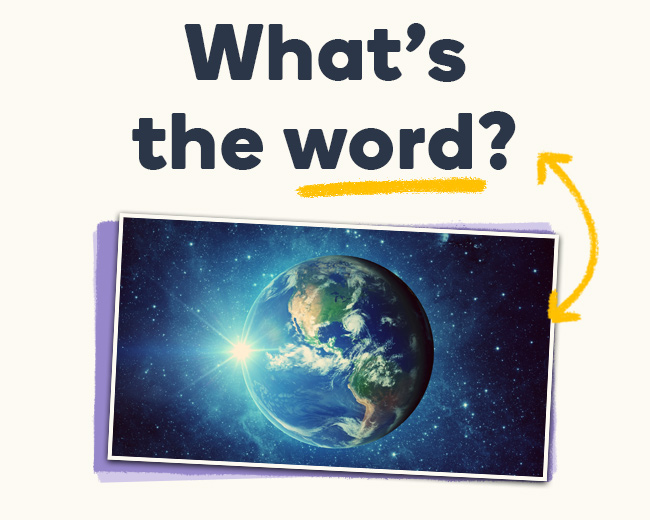Hey language learners! It’s time for your monthly dose of language and culture news in this latest edition of What’s the Word?. Today, we’re hearing about a TikTok trend that will either comfort you or cause your latest existential crisis... We'll also find out how bilingual brains work, the meaning behind a summertime saying, and some fun facts about everybody’s favourite musical activity: karaoke!
And speaking of karaoke, we’re announcing a super exciting giveaway to celebrate the launch of Memrise Music: our series of lyric-based language lessons. Read to the end to find out about how to enter and, most importantly, the prizes you could win…
We’re all just hanging out on a floating rock 🌍

TikTok fans among us may be familiar with a comforting new trend sweeping across the app at the moment! The aim of the ‘floating rock’ trend is to remind people not to dwell too much on the small things in life. These videos start with someone describing an anxiety or worry they have, and then the video begins to zoom further and further out, until it shows planet Earth floating in space. It’s hard not to gain some perspective on what really matters when you remember how tiny we actually are in the grand scheme of things!
This trend got us thinking about some of the most common worries that language learners share, the biggest one being a fear of making mistakes when speaking. Every language learner has probably encountered this block at some point, but it’s important to remember how insignificant it actually is. In fact, learning from mistakes is a super effective way to advance in a language! What’s your biggest worry when it comes to learning a language? Do you think this trend could help you let go of it? Feel free to create a TikTok and tag @memriseapp so that we can see your video!
How bilingual and multilingual brains work

We’ve all been there. You’re trying to speak the language you’ve been learning, it’s going well, but then you try to think of a simple word and your mind goes blank. Just like the title of this blog series, you ask yourself ‘what’s the word?’. Then, totally unhelpfully, your brain tells you that it knows the word you’re looking for, but in a different language! What’s all that about?!
Learners of multiple languages will be very familiar with sentences like ‘I can’t remember the word in French, but I know it in Korean!’, which leads to creative vocab solutions like this. Well, thanks to this cool research, we now know what goes on in our brains during these situations. Apparently when multilingual people speak, every language they know can be activated at once in their brain, even the one(s) they don’t need to access at that moment. Thanks a lot, brain! On top of this, the more you’re immersed in a new language, the more you can tend to forget words in your native language too! This explains why unintentional phrases in Spanglish, Franglais or other funky language combos can slip out. But this is all part of the beauty of being in the non-monolingual club (the best club), and we wouldn’t have it any other way!
Goodbye to the Dog Days of Summer
We’ve been baking in a long heatwave over the past month in the U.K. As a nation of people who love to discuss the weather, we’ve had a lot to talk about! Everyone seems to have strong opinions on summer, whichever side of the debate they’re on. While some of us spend 3 months of the year lurking about in the shade, lathered in factor 50 suncream, others panic at the very sight of a brown leaf.
So what are the Dog Days, and when are they over (as the famous Florence + the Machine song goes)? The Dog Days of summer are the very hottest days of the year, between early July and early August. It’s logical to assume that this expression comes from the fact that it’s too hot for dogs to be outside at this time of year, but there’s actually an astrological meaning behind it! During the Dog Days of summer, the bright ‘Dog Star’, Sirius, appears to rise with the sun. Because of this, the Romans thought that the star added to the sun’s heat at this time of year, and so they coined the phrase “diēs caniculārēs”, or “dog days”!
The true meaning of Karaoke

What’s your go-to-karaoke song? Do you get the crowd going with an upbeat banger or go for a dramatic rendition of an 80s power ballad? Whatever your style, we bet you don’t know how many karaoke bars there are in China, or where the Karaoke World Championship first took place… This article answers these questions and more! Our favourite karaoke fact is about the meaning of the word itself. In Japanese, ‘kara’ means ‘empty’ while ‘oke’ translates as ‘orchestra’, giving us the incredible translation of ‘empty orchestra’.
Check our new music-based language lessons in Spanish, French and Italian.
And that’s all for this edition of What’s the Word? Every month we round up some of the coolest things that are happening around the world and share them with you in the hope they’ll quench your language and general knowledge-seeking thirst just a little bit. Catch you next time!









